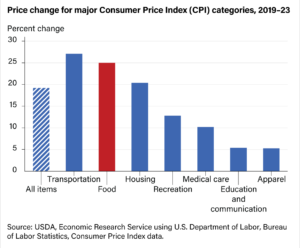Jim Tankersley and Jeanna Smialek of the New York Times reported last Friday that “Vice President Kamala Harris’s economic agenda for her presidential campaign includes an argument that blames corporate price gouging for high food prices.”
“This message resonates well with swing voters. It has been picked up by progressive groups that regularly point out that price gouging is a driver of rapid inflation, or at least contributes to rapid price increases. These groups cheered the announcement late Wednesday that “Ms. Harris would call for a nationwide ban on price gouging by grocery retailers in an economic policy speech on Friday,” Tankersley and Smialek reported. “But the economic debate on this issue is complicated..”

What is Harris’ plan?
Business Insider’s Ayelet Sheffey reported that “Harris’ campaign released new details of his economic plan on Friday ahead of a campaign speech in North Carolina, focusing largely on cutting costs for Americans struggling with inflation.”
“A central part of her plan was a ‘first-of-its-kind federal ban’ on price gouging on food and groceries. Price gouging, in which companies and corporations raise the price of goods excessively, is criticized by President Joe Biden and many Democratic lawmakers – and the Federal Trade Commission has also launched an investigation into high food prices,” Sheffey reported. “Harris’ fact sheet says she plans to implement this ban in her first 100 days in office and will direct the FTC to punish companies that don’t comply.”
“‘Price fluctuations are normal in free markets, but Vice President Harris recognizes that there is a big difference between fair prices and the inflated, cost-independent prices that Americans have experienced in the food and grocery industries,’ the plan’s fact sheet says,” according to Sheffey’s reporting.
Economists and agricultural associations express concerns
CNN’s Elisabeth Buchwald reported on Friday: “Harris’ proposal could create more problems than those it seeks to solve, some economists say.”
“Gavin Roberts studied anti-price gouging laws that some states passed during the pandemic. One of the biggest effects he observed, particularly in grocery stores, was that these laws motivated people to ‘buy more goods than they would have if prices had gone up,'” Buchwald reported. “When prices are high, the best policy response in most cases is to do nothing, Roberts, the head of Weber State University’s economics department, told CNN.”
“Jason Furman, a senior economist in the Obama administration, shared Roberts’ view that anti-price gouging laws could inadvertently harm consumers,” Buchwald reported. “‘This is not a sound policy, and I think the biggest hope is that it ends up being a lot of rhetoric and no reality,’ he told the New York Times. ‘There are no benefits to this, and there are some downsides.'”
Max Zahn of ABC News reported: “Michael Jones, an economics professor at the University of Cincinnati, said a government-imposed price cap could cause stores to run out of goods during times of shortages.“If there is a limit on the prices that companies can charge for their products, they simply won’t deliver,” Jones told ABC News.”
In addition, Chris Clayton of the Progressive Farmer reported that “the meat industry is pushing back against Vice President Kamala Harris’ plan to push for a federal ban on ‘price gouging’ in food, particularly meat prices.”
“Julie Anna Potts, president and CEO of the Meat Institute – the leading industry association for meatpackers – dismissed criticism of food inflation, saying Harris’ campaign rhetoric unfairly targets the meat and poultry industry,” Clayton reported. “Food prices are falling from pandemic highs, Potts noted, and meat prices are driven by supply and demand. The livestock and poultry industry is struggling with bird flu and a collapse in cattle prices, along with higher energy costs and a tight labor market.”
How serious is the price gouging?
Christopher Rugaber of the Associated Press reported: “It is unclear how high the price gouging currently is.”
“Food prices are still painfully high compared to four years ago, but they rose just 1.1% in July from a year ago, according to the latest inflation report. That’s in line with pre-pandemic increases,” Rugaber reported. “President Joe Biden said Wednesday inflation has been defeated after Wednesday’s inflation report showed it fell to 2.9% in July, the smallest increase in three years.”
“There’s a certain contradiction between saying you’ve won on the inflation front in one breath and then arguing that you’ve got all this price gouging that’s hitting consumers with really high prices in the next breath,” said Michael Strain, an economist at the American Enterprise Institute, according to Rugaber. “In general, once inflation has risen, it’s very hard to get prices back to where they were. Sustained price declines usually only happen in deep, drawn-out recessions. Instead, economists generally argue that the better approach is to raise wages enough so that Americans can afford the higher costs.”
